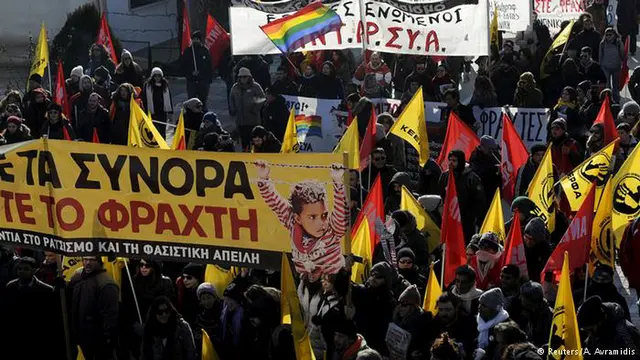Protesters marched to the Evros river fence at the border between Greece and Turkey on Sunday demanding that it will be demolished to open a safe, legal passage to Europe for the desperate refugees and migrants who risk their lives to enter the EU.
The protest came as the scenario of Greece's temporary exclusion from the Schengen passport free zone resurfaced over the past few days and as the death toll from the latest major tragedy in the Aegean Sea on Friday reached 45 fatalities, according to the Greek authorities.
"We say no to the fence of shame, no to Fortress Europe," chanted about 700 demonstrators next to the 4 tall high wall on Sunday afternoon wearing life vests.
Anti-racist activists, representatives of migrant communities in Greece, Left- wing parties and local youth asked that the Greek government opens the passage point for the people fleeing wars so that they will no longer risk their lives at sea attempting to reach the Greek islands from Turkey on their way to central and western European countries.
The protest which ended peacefully was organized as part of two-day international solidarity actions from Calais to Istanbul.
Greece built the fence in 2012 along the 12.5-kilometer stretch of land connecting Greece and Turkey in a part of Evros river which is the natural borderline between the two countries.
Until 2012 most undocumented migrants and refugees were seeking to cross over into Europe from this natural safe passage.
Local and foreign officials and experts had warned that desperate people and traffickers would not be hindered by the fence. They just turned to the more dangerous alternative of crossing the sea. The smugglers' tariff increased and thousands of lives perished.
Until 2012 about 100,000 people would have entered Europe via Evros annually, according to official statistics. After the erection of the wall, the percentage shrank by 90 percent.
A small group of three dozen refugees who managed to cross the river were stopped by police outside the town of Didymoteicho, two kilometers from the borderline, on Sunday.
Women with children in tow were pleading with officers to let them continue their journey on foot to Thessaloniki, 385 kilometers away, and then the border crossing between Greece and the Former Yugoslavian Republic of Macedonia (FYROM), eyewitnesses told Xinhua.
In 2015 more than 800,000 refugees and migrants landed on the Greek islands in old boats provided by smugglers on the other side of the Aegean. More than 3,500 people drowned in the Mediterranean Sea the same year.
In response to persistent calls to pull down the Evros fence lately Greek Prime Minister Alexis Tsipras said in late 2015 that the "dilemma cannot be whether people will die in the Aegean or Evros." He argued that the zone is "ridden with landmines." Cabinet ministers added that in the past people also perished in the waters of the river.
Protesters on Sunday insisted that it is the government's and Europe's duty to offer a safe passage to refugees so that they will not have to turn to illegal means to reach the continent.
Meanwhile, European officials were still debating the erection of walls across Europe to block the path of refugees and migrants and the idea of a possible temporary expulsion of Greece from Schengen came to the fore again.
Ahead of an EU Interior Ministers meeting on Monday in Amsterdam, Austrian, Hungarian and Slovenian officials openly called last week for a discussion on the issue during the meeting.
The Slovenian Prime Minister Miro Cerar tweeted that Slovenia's initiative to stop irregular migration at the Greek-Macedonian border should be examined. The idea which essentially amounts to Greece's exclusion of the Schengen zone, was publicly backed by the Hungarian Premier Victor Orban.
On Saturday in an interview with a German daily the Austrian Interior Minister Johanna Mikl-Leitner suggested that "if Athens does not finally do more to secure the EU's external borders then one must openly discuss Greece's temporary exclusion from Schengen. "
Greece has been harshly criticized by some European partners since the summer of 2015 of failing to effectively protect its borders. Others have acknowledged that the task is Herculean for one country.
Speaking on the Greek MEGA television channel on Sunday EU Migration and Home Affairs Commissioner Dimitris Avramopoulos dismissed the scenarios, stressing that the EU Commission does not support such ideas. "There is not such plan," he said.
Avramopoulos, European Commission President Jean-Claude Juncker and other officials have repeatedly warned that the construction of new walls and divisions between member states could lead to the collapse of Schengen and the EU structure in general.
 简体中文
简体中文

